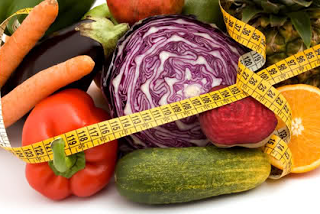Healthy Food Diet Menu - The food menu includes a healthy diet of vegetables and fruits that are routinely consumed the correct amount the body needs. To get a healthy low-calorie diet we will present information pertaining to this.
1. Add fruits and vegetables to your diet
Fruits and vegetables are the staple of a healthy natural diet, this healthy diet is low in calories and high in nutrients. Fruits and vegetables should be part of every your meal.
2. Eat more healthy carbs and whole grains
In addition to being delicious and satisfying, whole grains are rich in antioxidants and low in calories. They help protect the body against coronary heart disease, cancer, and diabetes.
Studies show people who eat whole grains tend to have a healthier heart. So, include a variety of grains in your healthy diet, including whole wheat, brown rice, millet, quinoa, and barley. Experiment with different grains to find your favorites. A bowl of Quaker Oats breakfast will help control your heart disease.
3. Fiber is an important component of a healthy diet
Dietary fiber that found in plant foods is very important for maintaining a healthy digestive system. Fiber is a great endorsement of a healthy diet low calorie and can help you feel full faster, and keep your blood sugar stable.
4. Put protein in perspective
Protein gives us the energy to keep going. Lack of protein in our diet can slow growth, reduce muscle mass, the lack of immunity, and weaken the heart and respiratory system. Protein is very important for the children, to stimulate growth. Such as :fresh fish, chicken, tofu, eggs, beans or nuts.
5. Add calcium & vitamin D for strong bones
Calcium and vitamin D is essential for strong bones and healthy. Vitamin D is essential for optimal calcium absorption in the small intestine. Recommended calcium levels are 1000 mg per day, 1200 mg if you are over 50 years old. Which include large sources of calcium are: dairy products , fortified with vitamin D. Leafy vegetables, such as kale and green Sosin. Legumes including peas.
6. Limit sugar and refined grains
It's okay to enjoy sweets, but try to reduce sugar. Sugar causes high energy which causes health problems such as arthritis, diabetes, osteoporosis, headaches, and depression.
7. Avoid excessive salt
Salt is actually not bad, but most of us consume too much salt in the diet. For how to deal with that is:
- Limit sodium to 2,300 mg per day, the equivalent of one teaspoon of salt. Most of us consume far more than a teaspoon of salt per day.
- Avoid processed, packaged, restaurant and fast food.
- Processed foods like canned soups or frozen meals contain excess sodium in a teaspoon a day .

0 comments:
Post a Comment